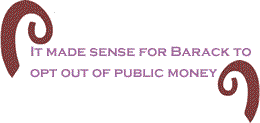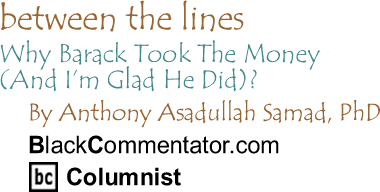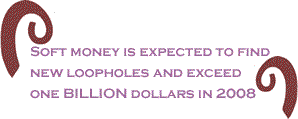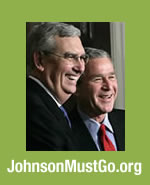
|
||||||||||||||||||||||
 |
||||||||||||||||||||||
 |
||||||||||||||||||||||
 |
||||||||||||||||||||||
 |
||||||||||||||||||||||
 |
||||||||||||||||||||||
 |
|||
| The current issue is always free to everyone | |||
|
|
|||
 |
|||
Much
ado (about nothing) has been made about Barack Obama becoming
the first Presidential candidate to reject public financing
of Presidential elections (and the $84.1 million spending limit
that comes with it) since it started in 1976. Mainly that Obama
reversed himself on his position as a supporter of campaign
spending limits and a previous stated commitment to take the
public financing. This was a no-brainer as far as Barack was
concerned. Understanding the Republican strategies of the past two elections, while we don’t know what the issue will be, Obama’s decision essentially came down to two words (whether he’ll admit it or not), “Swift Boat.” The Swift Boat attack ads of 2004, driven by independent expenditure (IE) groups, dogged John Kerry’s candidacy and dictated his campaign strategy. Kerry didn’t respond to the Swift Boat ads as quickly as he needed to because of decisions about where his money when be best served, campaigning or defending allegations. When he finally decided, he was forced to spend money defending his war record, and the “flip-flop” allegations on the Iraqi War, causing whatever message he was tried to get out to the America people (I still don’t know what it was) to get lost in the campaign clutter. For this reason, and this reason alone, it made sense for Barack to opt out of public money. It gives him the flexibility to respond to attacks. We would be naďve to believe it’s not going to happen-there will be some “swift-boating” going on in 2008. For this reason alone, Barack took the money.
They call themselves things like, “Swift Boat Veterans for Truth” and
they (and the party candidate) deny any contact or cooperation
with their party’s Presidential campaign. Soft money has grown,
according to the watchdog group, Common Cause, from $86 million
in 1992 to $260 in 1996 and over $750 million in each of the
Presidential elections held in 2000 and 2004. In each of those
elections, the Republican Party significantly out-raised the
Democratic Party. Obama has over 1.5 million donors, half of who have given $200 or less.
He has an obvious advantage in fundraising, and a greater capacity
to raise more. Why would he concede such an advantage when Republicans
have never conceded any advantage they have held? This will
be the first Democratic Presidential candidate that is projected
to out-raise a Republican.
So, I shouted from the mountaintop when Obama made his announcement, “Take the uncapped money, Barack.” He did and I’m glad - now it will be close to a fair race (fight). BlackCommentator.com Columnist, Dr. Anthony Asadullah Samad, is a national columnist, managing director of the Urban Issues Forum and author of Saving The Race: Empowerment Through Wisdom. His Website is AnthonySamad.com. Click here to contact Dr. Samad. |
|||
Any BlackCommentator.com article may be re-printed so long as it is re-printed in its entirety and full credit given to the author and www.BlackCommentator.com. If the re-print is on the Internet we additionally request a link back to the original piece on our Website. Your comments are always welcome. eMail
re-print notice
If you send us an eMail message we may publish all or part of it, unless you tell us it is not for publication. You may also request that we withhold your name. Thank you very much for your readership. |
|||
|
| June
26, 2008 Issue 283 |
|
| Executive Editor: Bill Fletcher, Jr. |
| Managing
Editor: |
| Publisher: Peter Gamble |
| Est. April 5, 2002 |
| Printer Friendly Version in resizeable plain text format or pdf format. |
 |
 |
 |
| |
| |






















 Aside
from the obvious, there were a number of reasons to opt out
of public financing. It’s interesting that the Republican Party
is doing the most whining this election cycle - the first time
someone has finally figured out how they roll. Republican Presidential
candidates never had to opt out of the “hard money” constraints
that public financing rules place on candidates because they
owned the “soft money” processes that supplemented their candidates’
message and ideological agendas. Soft money is money from large
contributors - corporations, large donors, labor unions, who
give to the political parties to get around the federal individual
and PAC contribution limits, specifically for the purpose of
running partisan “independent” advertisements, so-called “issues
ads” - mostly to attack their party’s opposing candidate.
Aside
from the obvious, there were a number of reasons to opt out
of public financing. It’s interesting that the Republican Party
is doing the most whining this election cycle - the first time
someone has finally figured out how they roll. Republican Presidential
candidates never had to opt out of the “hard money” constraints
that public financing rules place on candidates because they
owned the “soft money” processes that supplemented their candidates’
message and ideological agendas. Soft money is money from large
contributors - corporations, large donors, labor unions, who
give to the political parties to get around the federal individual
and PAC contribution limits, specifically for the purpose of
running partisan “independent” advertisements, so-called “issues
ads” - mostly to attack their party’s opposing candidate.
 Barack
has raised more money than any “non-incumbent President” political
candidate ever. Largely because, through the internet,
he’s opened up the political process to the average Joe (or
Jane). Public financing would return the political process back
to the “traditional donors,” the rich, the corporate and the
well-connected and make soft money “the decider” in this year’s
election. He committed to public financing under the premise
that everyone else (the Republican nominee included) would close
soft money loopholes and play by the same rules. Of course,
history has taught that Republicans never play by the same rules
- and where none exist, they make up their own. What reason
do the American people have to believe that this election cycle
will be any different? A broken system is still broke, and this
aspect of the broke system has the biggest broken part. Barack
knows that. That’s why he opted out of public financing. When
they come after him, he’ll have the money to do what he needs
to do, rebut the IE attack ads, and target battleground states
that McCain will take for granted to change the political landscape.
The Democrats will make the Republicans spend money defending
their record (the Bush-McCain record) for a change.
Barack
has raised more money than any “non-incumbent President” political
candidate ever. Largely because, through the internet,
he’s opened up the political process to the average Joe (or
Jane). Public financing would return the political process back
to the “traditional donors,” the rich, the corporate and the
well-connected and make soft money “the decider” in this year’s
election. He committed to public financing under the premise
that everyone else (the Republican nominee included) would close
soft money loopholes and play by the same rules. Of course,
history has taught that Republicans never play by the same rules
- and where none exist, they make up their own. What reason
do the American people have to believe that this election cycle
will be any different? A broken system is still broke, and this
aspect of the broke system has the biggest broken part. Barack
knows that. That’s why he opted out of public financing. When
they come after him, he’ll have the money to do what he needs
to do, rebut the IE attack ads, and target battleground states
that McCain will take for granted to change the political landscape.
The Democrats will make the Republicans spend money defending
their record (the Bush-McCain record) for a change.








